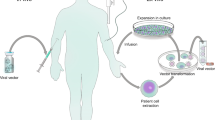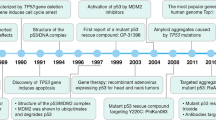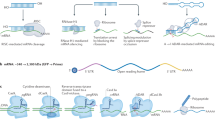Abstract
Peritoneal dissemination is the most common condition of metastasis in gastric cancer. The survival duration of a patient with advanced stage gastric cancer, may be improved by gene therapy. In this study, we used an oncolytic adenovirus vector (Ad/TRAIL-E1) that expresses both the TRAIL and E1A genes under the control of a tumor-specific promoter. We evaluated the anti-tumor effect of Ad/TRAIL-E1 on gastric cancer cells in vitro, as well as in vivo in a xenograft peritoneal carcinomatosis mouse model. Our data showed that Ad/TRAIL-E1 induced TRAIL-mediated apoptosis in gastric cancer cell lines, but not in the normal cell lines. In addition, Ad/TRAIL-E1 significantly inhibited peritoneal metastasis and prolonged the survival of mice without treatment-related toxicity. Therefore, tumor-specific TRAIL expression from an oncolytic adenovirus vector may provide a novel therapeutic approach for the treatment of advance stage gastric cancer with peritoneal dissemination.
This is a preview of subscription content, access via your institution
Access options
Subscribe to this journal
Receive 12 print issues and online access
$259.00 per year
only $21.58 per issue
Buy this article
- Purchase on Springer Link
- Instant access to full article PDF
Prices may be subject to local taxes which are calculated during checkout






Similar content being viewed by others
References
Torre LA, Bray F, Siegel RL, Ferlay J, Lortet-Tieulent J, Jemal A . Global cancer statistics, 2012. CA Cancer J Clin 2015; 65: 87–108.
Siegel RL, Miller KD, Jemal A . Cancer statistics, 2015. CA Cancer J Clin 2015; 65: 5–29.
Roviello F, Caruso S, Neri A, Marrelli D . Treatment and prevention of peritoneal carcinomatosis from gastric cancer by cytoreductive surgery and hyperthermic intraperitoneal chemotherapy: overview and rationale. Eur J Surg Oncol 2013; 39: 1309–1316.
Imano M, Okuno K . Treatment strategies for gastric cancer patients with peritoneal metastasis. Surg Today 2014; 44: 399–404.
Averbach AM, Jacquet P . Strategies to decrease the incidence of intra-abdominal recurrence in resectable gastric cancer. Br J Surg 1996; 83: 726–733.
Moriguchi S, Maehara Y, Korenaga D, Sugimachi K, Nose Y . Risk factors which predict pattern of recurrence after curative surgery for patients with advanced gastric cancer. Surg Oncol 1992; 1: 341–346.
Yang XJ, Huang CQ, Suo T, Mei LJ, Yang GL, Cheng FL et al. Cytoreductive surgery and hyperthermic intraperitoneal chemotherapy improves survival of patients with peritoneal carcinomatosis from gastric cancer: final results of a phase III randomized clinical trial. Ann Surg Oncol 2011; 18: 1575–1581.
Glehen O, Gilly FN, Boutitie F, Bereder JM, Quenet F, Sideris L et al. Toward curative treatment of peritoneal carcinomatosis from nonovarian origin by cytoreductive surgery combined with perioperative intraperitoneal chemotherapy: a multi-institutional study of 1,290 patients. Cancer 2010; 116: 5608–5618.
Kreppel F, Kochanek S . Modification of adenovirus gene transfer vectors with synthetic polymers: a scientific review and technical guide. Mol Ther 2008; 16: 16–29.
Uusi-Kerttula H, Hulin-Curtis S, Davies J, Parker AL . Oncolytic adenovirus: strategies and insights for vector design and immuno-oncolytic applications. Viruses 2015; 7: 6009–6042.
Sakai R, Kagawa S, Yamasaki Y, Kojima T, Uno F, Hashimoto Y et al. Preclinical evaluation of differentially targeting dual virotherapy for human solid cancer. Mol Cancer Ther 2010; 9: 1884–1893.
Larson C, Oronsky B, Scicinski J, Fanger GR, Stirn M, Oronsky A et al. Going viral: a review of replication-selective oncolytic adenoviruses. Oncotarget 2015; 6: 19976–19989.
Kurihara T, Brough DE, Kovesdi I, Kufe DW . Selectivity of a replication-competent adenovirus for human breast carcinoma cells expressing the MUC1 antigen. J Clin Invest 2000; 106: 763–771.
Tsukuda K, Wiewrodt R, Molnar-Kimber K, Jovanovic VP, Amin KM . An E2F-responsive replication-selective adenovirus targeted to the defective cell cycle in cancer cells: potent antitumoral efficacy but no toxicity to normal cell. Cancer Res 2002; 62: 3438–3447.
Ma SH, Chen GG, Yip J, Lai PB . Therapeutic effect of alpha-fetoprotein promoter-mediated tBid and chemotherapeutic agents on orthotopic liver tumor in mice. Gene Therapy 2010; 17: 905–912.
Xu C, Sun Y, Wang Y, Yan Y, Shi Z, Chen L et al. CEA promoter-regulated oncolytic adenovirus-mediated Hsp70 expression in immune gene therapy for pancreatic cancer. Cancer Lett 2012; 319: 154–163.
Kim NW, Piatyszek MA, Prowse KR, Harley CB, West MD, Ho PL et al. Specific association of human telomerase activity with immortal cells and cancer. Science 1994; 266: 2011–2015.
Davis JJ, Wang L, Dong F, Zhang L, Guo W, Teraishi F et al. Oncolysis and suppression of tumor growth by a GFP-expressing oncolytic adenovirus controlled by an hTERT and CMV hybrid promoter. Cancer Gene Ther 2006; 13: 720–723.
Pitti RM, Marsters SA, Ruppert S, Donahue CJ, Moore A, Ashkenazi A . Induction of apoptosis by Apo-2 ligand, a new member of the tumor necrosis factor cytokine family. J Biol Chem 1996; 271: 12687–12690.
Wiley SR, Schooley K, Smolak PJ, Din WS, Huang CP, Nicholl JK et al. Identification and characterization of a new member of the TNF family that induces apoptosis. Immunity 1995; 3: 673–682.
Johnstone RW, Frew AJ, Smyth MJ . The TRAIL apoptotic pathway in cancer onset, progression and therapy. Nat Rev Cancer 2008; 8: 782–798.
Lin T, Huang X, Gu J, Zhang L, Roth JA, Xiong M et al. Long-term tumor-free survival from treatment with the GFP-TRAIL fusion gene expressed from the hTERT promoter in breast cancer cells. Oncogene 2002; 21: 8020–8028.
Dong F, Wang L, Davis JJ, Hu W, Zhang L, Guo W et al. Eliminating established tumor in nu/nu nude mice by a tumor necrosis factor-alpha-related apoptosis-inducing ligand-armed oncolytic adenovirus. Clin Cancer Res 2006; 12: 5224–5230.
Zhou W, Zhu H, Chen W, Hu X, Pang X, Zhang J et al. Treatment of patient tumor-derived colon cancer xenografts by a TRAIL gene-armed oncolytic adenovirus. Cancer Gene Ther 2011; 18: 336–345.
Lin T, Gu J, Zhang L, Huang X, Stephens LC, Curley SA et al. Targeted expression of green fluorescent protein/tumor necrosis factor-related apoptosis-inducing ligand fusion protein from human telomerase reverse transcriptase promoter elicits antitumor activity without toxic effects on primary human hepatocytes. Cancer Res 2002; 62: 3620–3625.
Jacob D, Davis J, Zhu H, Zhang L, Teraishi F, Wu S et al. Suppressing orthotopic pancreatic tumor growth with a fiber-modified adenovector expressing the TRAIL gene from the human telomerase reverse transcriptase promoter. Clin Cancer Res 2004; 10: 3535–3541.
Takakura M, Nakamura M, Kyo S, Hashimoto M, Mori N, Ikoma T et al. Intraperitoneal administration of telomerase-specific oncolytic adenovirus sensitizes ovarian cancer cells to cisplatin and affects survival in a xenograft model with peritoneal dissemination. Cancer Gene Ther 2010; 17: 11–19.
Wadler S, Yu B, Tan JY, Kaleya R, Rozenblit A, Makower D et al. Persistent replication of the modified chimeric adenovirus ONYX-015 in both tumor and stromal cells from a patient with gall bladder carcinoma implants. Clin Cancer Res 2003; 9: 33–43.
Nguyen M, Branton PE, Roy S, Nicholson DW, Alnemri ES, Yeh WC et al. E1A-induced processing of procaspase-8 can occur independently of FADD and is inhibited by Bcl-2. J Biol Chem 1998; 273: 33099–33102.
Querido E, Teodoro JG, Branton PE . Accumulation of p53 induced by the adenovirus E1A protein requires regions involved in the stimulation of DNA synthesis. J Virol 1997; 71: 3526–3533.
Ishida M, Kagawa S, Shimoyama K, Takehara K, Noma K, Tanabe S et al. Trastuzumab-based photoimmunotherapy integrated with viral HER2 transduction inhibits peritoneally disseminated HER2-negative cancer. Mol Cancer Ther 2016; 15: 402–411.
Natatsuka R, Takahashi T, Serada S, Fujimoto M, Ookawara T, Nishida T et al. Gene therapy with SOCS1 for gastric cancer induces G2/M arrest and has an antitumour effect on peritoneal carcinomatosis. Br J Cancer 2015; 113: 433–442.
Tanaka T, Huang J, Hirai S, Kuroki M, Watanabe N, Tomihara K et al. Carcinoembryonic antigen-targeted selective gene therapy for gastric cancer through FZ33 fiber-modified adenovirus vectors. Clin Cancer Res 2006; 12: 3803–3813.
Tsunemitsu Y, Kagawa S, Tokunaga N, Otani S, Umeoka T, Roth JA et al. Molecular therapy for peritoneal dissemination of xenotransplanted human MKN-45 gastric cancer cells with adenovirus mediated Bax gene transfer. Gut 2004; 53: 554–560.
Fang B, Ji L, Bouvet M, Roth JA . Evaluation of GAL4/TATA in vivo. Induction of transgene expression by adenovirally mediated gene codelivery. J Biol Chem 1998; 273: 4972–4975.
Acknowledgements
We thank Dr Yongqiang Liao for his assistance in pathology evaluation. This work was supported by the National Natural Science Foundation of China grant 81402580, 81370461 and 81272681.
Author information
Authors and Affiliations
Corresponding author
Ethics declarations
Competing interests
The authors declare no conflicts of interest.
Rights and permissions
About this article
Cite this article
Zhou, W., Dai, S., Zhu, H. et al. Telomerase-specific oncolytic adenovirus expressing TRAIL suppresses peritoneal dissemination of gastric cancer. Gene Ther 24, 199–207 (2017). https://doi.org/10.1038/gt.2017.2
Received:
Revised:
Accepted:
Published:
Issue Date:
DOI: https://doi.org/10.1038/gt.2017.2
This article is cited by
-
TRAIL promotes hepatocellular carcinoma apoptosis and inhibits proliferation and migration via interacting with IER3
Cancer Cell International (2021)
-
Development of oncolytic virotherapy: from genetic modification to combination therapy
Frontiers of Medicine (2020)
-
Efficacy of combining ING4 and TRAIL genes in cancer-targeting gene virotherapy strategy: first evidence in preclinical hepatocellular carcinoma
Gene Therapy (2018)
-
Prospects for combined use of oncolytic viruses and CAR T-cells
Journal for ImmunoTherapy of Cancer (2017)



